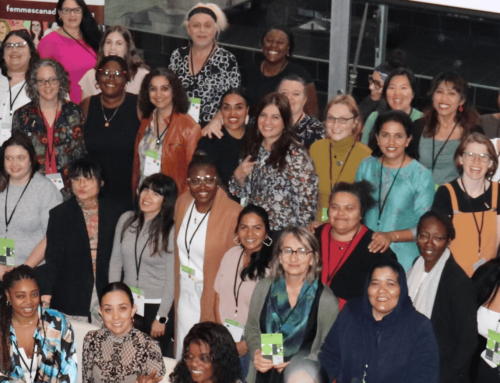Let’s say you’re a single mom who works at a grocery store. How do you continue working now that COVID-19 has closed daycares and schools? How do you support yourself and your children?
The pandemic is intensifying economic barriers women already face throughout Canada, and research suggests that pandemics can take a higher toll on women’s incomes than men’s. Although federal and provincial aid and relief announcements are encouraging, many women are still at risk of falling through the cracks:
Women living on a low income in Canada
Women make up 60 per cent of those in Canada who are economically “struggling”, meaning that they report difficulty covering basic expenses and may need pay day loans or food banks to get by. The COVID-19 pandemic means new challenges to delivering support services for those who are struggling, such as food banks that can’t meet demand, and closures of public services including schools, community centres, and libraries.
The Foundation supports programs for women to get into skilled trades and technology, start their own businesses, and participate in social enterprises. These programs address the needs of women with particular barriers to employment, including newcomer women; First Nations, Métis and Inuit women; and women rebuilding their lives after abuse. Where programs might have to go on hold, participants’ journeys may also be on hold. It’s also likely there will be increased need for such job-training programs as predictions of an economic recession loom.
Women in precarious industries and jobs in Canada
With travel locked down, layoffs have already hit women-heavy industries. Workers affected include flight attendants, cooks, servers, and cleaners in travel and hospitality. As stores close or reduce hours, there are cutbacks for retail workers, many of whom are also women. Women in the already precarious and undervalued childcare sector have also stopped work as daycares are closed (except those serving essential-service workers). Aside from industries shut down by COVID-19, women also make up the majority of Canada’s minimum-wage workers and part-time workers. These positions are precarious at the best of times.
As a Toronto Star column noted, our current circumstances spotlight how many undervalued professions are crucial to our daily well-being. Health-care workers — including doctors, nurses, and paid caregivers — don’t have the privilege of isolating at home because we’re depending on them to deliver care. Cleaners, cashiers, and food-service workers also continue to play key roles in serving the public at grocery stores, drug stores, pharmacies, and other essential businesses and services that remain open.
Women facing a double burden of unpaid and paid work in Canada
In Canada, 80 per cent of single-parent households are led by women, and they may be wondering how to keep working and feed their children. In general, statistics show that women in Canada carry more unpaid housework and caregiving responsibilities than men, including child and elder care. Women are also more likely to sacrifice career and economic advancement opportunities to accommodate caregiving. “School closures and household isolation are moving the work of caring for children from the paid economy – nurseries, schools, babysitters — to the unpaid one,” says The Atlantic article “Coronavirus is a Disaster for Feminism.” As dual-earner couples juggle responsibilities, it’s likely that the partner who makes the least money will absorb increased unpaid caregiving — and may scale back their paid work to do so.
We don’t know how long COVID-19 will impact the world, but we do know that women’s workforce participation will play a key role in Canada’s economic recovery. We know we have to continue working for gender equality, and your continued support of the Canadian Women’s Foundation is more important than ever.
If you are able, please contribute to our Tireless Together Fund launched in response to the COVID-19 crisis in Canada. Your contribution will help ensure programs for diverse women, girls, and trans and non-binary people can continue through the pandemic and into the aftermath, including programs that build leadership skills and opportunities.
If you are able, please contribute to our Tireless Together Fund launched in response to the COVID-19 crisis in Canada. Your contribution will help ensure programs for diverse women, girls, and trans and non-binary people can continue through the pandemic and into the aftermath, including programs that build leadership skills and opportunities.
Learn more:
Women’s “Worry Work in the COVID-19 Pandemic
Women’s Leadership in COVID-19: Seen and Unseen
The Gendered Impacts of Coronavirus







